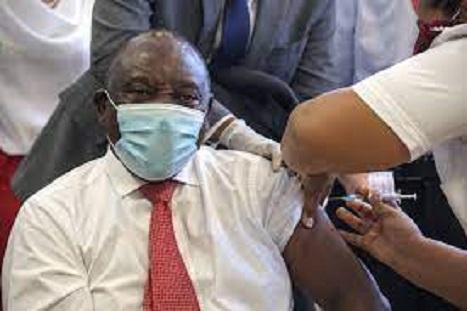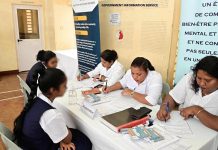Africa-Press – Mauritius. No one is safe until everybody is safe” is a constantly repeated refrain that sounds reassuring coming from rich Western countries as it implies that it is in their interests as well to make sure that Covid-19 vaccines reach everybody around the world – no matter their ability to pay for them.
The reality – at least so far – is very different. When push comes to shove, as they say, it’s everybody for themselves. For example, by mid-February, Australia, Canada, Japan, the UK, US and the EU had ordered three billion doses of vaccines among themselves.
Even after everybody in these countries had been vaccinated twice, they would still be left holding 1.2bn excess doses. “It is deeply unjust that the most vulnerable Africans are forced to wait for vaccines while lower-risk groups in rich countries are made safe,” said Matshidiso Moeti, the World Health Organisation (WHO) regional director for Africa.
Speaking at the Munich Security Conference, the UN Secretary-General, António Guterres, said that 75% of vaccines had been monopolised by 10 countries, while more than 100 countries had not received a single dose.
However, despite supply-side constraints, some African countries have managed to get hold of vaccines – either by purchasing them directly from manufacturers or as donations from India, China, Russia and the UAE.
South Africa, which called a halt to its vaccination programme following worries that the AstraZeneca variety would be ineffective against the new Covid variant, has secured, according to President Cyril Ramaphosa, some 9m doses of the Johnson & Johnson vaccine, which is effective against it.
South Africa donated 1m doses of the AstraZeneca vaccine to the AU, which has pooled around 670m doses – sufficient to vaccinate 38% of Africa’s population.
A healthcare worker fills a syringe from a vial with a dose of the Johnson & Johnson Covid-19 vaccine as South Africa proceeds with its inoculation campaign.
At the time of writing in late February, the following African countries had already started vaccination programmes: Morocco (AstraZeneca and Sinopharm); Algeria (Sputnik V); Egypt (Sinopharm); Seychelles (Sinopharm and AstraZeneca); Rwanda (Pfizer and Moderna); Mauritius (AstraZeneca); Zimbabwe (Sinopharm) and South Africa (Johnson & Johnson).
According to reports, Senegal and Equatorial Guinea had received deliveries of Sinopharm but vaccination had not yet started. But the vast majority of African and other developing countries are still very far behind the advanced countries in accessing vaccines.
With strong pressure on rich countries to make good on their earlier commitment to help poor nations access vaccines coming from the WHO, the UN and NGOs, the G7 – accused by Oxfam last year of lacking a co-ordinated approach – took decisive action during their virtual summit hosted by Britain.
Prime Minister Boris Johnson said that Britain would donate its excess doses to poorer countries (through the UN-led Covax) and urged other members to follow suit. By the end of the summit, the G7 had pledged an additional $7.5bn to fund vaccine purchases for developing countries.
US President Joe Biden made a welcome appearance at the G7, signalling the US’s intention to reclaim its leadership role in the “free world”, and pledged $4bn to Covax. The EU said it would also provide $140m “in kind” support to African countries.
Emmanuel Macron, President of France, said it was not enough to pledge money and that the developed world had to make sure that vaccines got to their destinations and that vaccination programmes could be undertaken.
He added that the immediate target should be the 6.5m health workers in Africa. “This will require 13m doses,” he said, “amounting to 3.4% of the supply available in Europe, and should be sent immediately.
”
Interestingly enough, a poll among ordinary Britons – who are usually among the most generous – showed that the country was split over the donations, with some saying the first priority should be to blanket-vaccinate the UK, then worry about other countries, while others pointed out that unless the disease was curbed everywhere, neither normal trade nor travel could continue and that Britain and other rich countries had a moral duty to ensure that all countries would receive the vaccines.
Is Covax fit for purpose? The WHO’s Director-General, Dr Tedros Adhanom Ghebreyesus, recently warned that the world was on the brink of “catastrophic moral failure” because of the unequal distribution of Covid vaccines and rising “vaccine nationalism”, as underlined by the UK-EU spat over the disrupted AstraZeneca supply chain to the EU.
The appearance and spread of mutations and new variants of the virus, especially the Kent, South African and Brazilian ones, is exacerbating supply chains and accessibility problems. Prof.
Salim Abdool Karim, chair of the South African government’s coronavirus advisory panel, questioned the “unconscionable behaviour” of rich countries in hoarding vaccine supplies and warned again that “no-one is safe until everyone is safe”.
The uncertainty of the pathway of the virus, potential future supply chain disruptions and doubts over vaccine efficacy in certain age groups, create the perfect storm for vaccine volatility, likely to last well beyond 2021.
Currently, the procurement of Covid-19 vaccines is financed by governments, private medical insurance or through the Covid-19 Vaccines Global Access (Covax) facility for equitable access to vaccines.
It is led by the Coalition for Epidemic Preparedness Innovations (CEPI); the Global Vaccine Alliance (GAVI); and the World Health Organisation (WHO). It is intended primarily for low and middle-income countries.
However, if anyone thinks that the Covax facility is a panacea, then its interim distribution forecast released in February is a sobering reality check. The facility has 145 participating countries including 44 from Africa.
The final allocations for First Half 2021 (FH21) are being finalised, and the addition of AstraZeneca/SK Bioscience (AZ-SKBio) and AstraZeneca/SII (AZ/SII) in mid-February as approved vaccine sources, will relieve some pressure on supply chain dynamics.
However, the vaccine supply chain under Covax is complex, subjective and based on current communications about estimated availability from manufacturers.
Covax is funded either through self-financing participants (SFPs) such as South Africa, or through its Advanced Market Commitment (AMC) facility, donated largely by rich countries, multilaterals and private donors.
Most African countries fall under the AMC facility. The distribution data are revealing. Total doses cover on average only 3.3% of the total population of the 145 participants.
This is in line with Covax’s aim of achieving an at least 3% population coverage in all countries in FH21, which is enough to protect only the most vulnerable groups such as health care workers. Covax has also introduced new conditions before countries can receive any vaccines.
These include the submission of signed indemnity agreements with the manufacturers in question, by all participating nations; while AMC-eligible countries must have submitted National Deployment and Vaccination Plans (NDVPs) through the Covid-19 Partners Platform, which have then been reviewed and validated by Covax.
To its credit, the facility is helping to facilitate the process of getting these agreements in place. Covax, for instance, is supporting AMC-eligible participants by negotiating a template indemnity agreement on their behalf – saving time and resources – and establishing a no-fault compensation mechanism and fund.
Robust South African approach South Africa’s approach has transformed from being a ‘Johnny come lately’, to a newfound vaccine optimism. “Our scientists estimate that we will likely reach herd immunity once around 67% of our people are immune,” says South Africa’s Minister for Health, Dr Zweli Mkhize.
The aim is to achieve this in 2021. The government has been in speed procurement mode, opening negotiations on several fronts, including with Moderna, Johnson & Johnson (J&J), Sputnik of Russia and Sinovac and Sinopharm of China.
Suppliers agreed so far include AZ/SII (1m doses) and J&J (9m doses, of which 80,000 were delivered in February). The biggest order is with Pfizer for 20m doses, to be supplied by Q2.
Approximately 12m doses will come via the Covax facility. The Covid Solidarity Fund will cover the upfront payment of 15% of the total cost of procurement.
MTN, the South African multinational mobile telco, which operates in many African countries, has donated $25m to procure 7m vaccines, to be distributed to several African countries.
“A considerable amount of work has been done with the private sector and I am pleased that there is strong commitment to support every aspect of the national vaccine roll-out effort. This includes funding when needed, logistics, distribution and administration,” confirmed Dr Mkhize to parliament recently.
In another development, South Africa’s representative to the WTO, Mustaqeem De Gama, has introduced a proposal arguing that bypassing intellectual property rights would allow much more of the world’s population to be quickly vaccinated, by rapidly increasing production.
This would break the monopoly of the big pharmaceutical companies and allow manufacturers based in developing countries to produce vaccines at a faster rate. He called on advanced countries to stop blocking a patent waiver put forward at the WTO.
He also pointed out that South Africa had to pay double the price paid by European countries for AstraZeneca vaccines and called for greater transparency on pricing and supply decisions. Supported by a phalanx of developing nations, De Gama said: “While Rome is burning, we are fiddling around waiting.”
For More News And Analysis About Mauritius Follow Africa-Press







